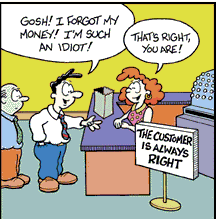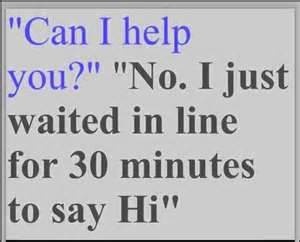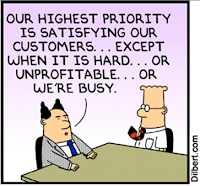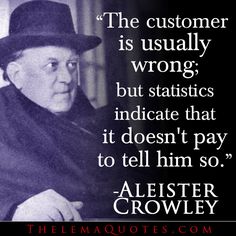 |
| Customer rules, Not! |
Customer interaction has always been considered important in any business. The statement, Customer is always right, has origins in retail industry, but it is a general statement for any service industry. If you are in a service industry then this is always mentioned in all kind of company messages; in employee orientation programs, sales presentations, existing customer engagements. Some times it is considered so important that it is even mentioned in companies vision statement or value statement. After all customer is the business and the reason why service company exists. Sure, it is not a perfect statement in an absolute sense, but the main message to me is that be aligned with customer and be careful to the requirements. I do not know about other industries, but Information Technology (IT) companies providing services seems to have different understanding of customer interaction. My simple understanding is that if I am providing services, then I need to listen and understand the customer and his needs. If I have the capability to deliver, then I need to tailor them as per customer needs. If I do not have existing capability, then I need to acquire it or develop it, but still keeping customer needs in mind. I am not talking about numbers and statistics, the ones that generally becomes the running definition of a service contract. In this article, I am concerned about the needs, which are hard to put in contract. The same needs and understanding based on which service companies tries to distinguish and sell themselves. For some reason in my experience, I missed to see it getting realized once the sales presentation is over and available to be reused for next customer.
Once, I happened to work for a customer, while working for one of the leading companies providing IT service. What I heard before joining the project was that this was the biggest customer in its domain. Company had put a lot of effort to “win” the deal. At the same time, I also heard that project was always in escalation mode. Reason was simple, we do not meet customer requirements. Bout two year in the project and still not able to meet the minimum requirements. Provider was not only missing in the target requirements, it did not have good understanding of the requirements. This was the origin of the problems, as the pricing was done without understanding what it means to deliver it. It means that in the 1st stage of customer interaction, it was not about understanding the needs, but about meeting the financial goal of sales and adding another big name in the list. Nevertheless, once the customer was told that they will have best of people working for them, all they got was a team full of newbies just out of college. Even the people who were customer facing with years of experience, lacked the ability to understand. I happened to be part of meetings to have first hand experience.
The meeting was with one such person, who has been in the project from the beginning and seen all the challenging time. I was only 4 months in the project. I was told that now are better times. Due to some change in the contract, we had to report certain metrics officially for a service that we were providing. This also meant that there are some exceptions that need to be agreed with the customer. This was simply to safeguard against financial penalties due to delays from customer or other service providers. To make it even challenging, by default no exceptions were accepted, unless they have been justified with full evidence and agreed by management. In simple words, if you talk about exceptions customer simply says NO and do not want to discuss any further. Now for this customer and this situation my colleague had about 4 weeks to prepare. Despite that, an hour before the meeting, he was struggling on how and what to put in the presentation. He asked me and I helped to put something together, whatever could be in that time. I gave the presentation to him to use in the meeting. When he started the meeting with title slide of the presentation, he probably did not see the face of the customer. He started with simple lines that there is a change and we need to setup exceptions and this presentation is about what are those and how we will use it. He probably again did not see customer face when customer asked the question, “So does that mean you will take away those delayed cases so that your over all report “green”. Is this the purpose?”. He ,with his simple way, said, “Yes, that is the objective”. I knew from the 1st line of the meeting, how the meeting is going to flow, but interrupting in between won’t make sense. In 5 minutes customer stopped the meeting saying, “If this is the objective, I do not want to discuss it. Close the meeting!”. My colleague was silent. I got a chance to interrupt to put a case that meeting probably took a wrong direction than it was supposed to. I had to 1st align with the customer about the need of the exceptions from his point of view. I managed to convey the message that these report has significant meaning now, when these report goes to both customer and provider senior management. Th exceptions are not only to show providers report as “green”, but main purpose is that once these exceptions are agreed beforehand, it helps to avoid last minute work and escalations. It helps both customer and provider to answer management’s questions with same message than having different perspectives. Customer than agreed with the objectives and we finished with meeting successfully.
This is the way provider manages customer interactions after winning the contract by saying how good it is in customer interactions. How everything is customized as per the understanding of its requirement. This is only one of the examples of many scenarios, where customer would simply say that provider is not listening or not able to understand what customer has requested. It did not matter, if the person interacting with customer is senior or junior or new or was there from beginning of the contract. It was not only this customer, same is at other places as well. In another customer, situation was completely different. There, provider had the complete control as the customer was extremely soft or may be lazy; it is hard to say. It was a big project with projects and services all managed by provider. Provider was the default selection for any new project and a strategic partner. In such a major partnership, if there was a meeting to design some strategy or develop some new proposal for the project, provider will start to ask for payment to joint such meetings as they are not part of the existing contract! Few meetings in a multi-million dollar project and some will be lead to potential revenues. But.
I am not suggesting that it is always providers fault. After all the person who made the sales deal had some targets, which once he met, he got some percentage with which he was able to buy a new apartment or a new car or got a promotion or used this as a highlight to move to another company. He had needs and wants and he did what he could to meet those. It is a different matter that there were others who had to pay the price. At the same time, customers also make the decision mostly on the price tag. If it is cheap, they take it. CFO is happy with his numbers and now rest of the team has to manage through the daily struggles. It becomes even more complicated when customer do not know what they are supposed to get and provider do not know what they are supposed to deliver. Somehow the cart keeps on moving, by pushing left or right and sometimes by hitting the bulls( if you have).
Once I was with a customer, who was so far dealing with local division of the service company in his country. Due to costs, project got outsourced to offshore division. When I met him, it was only few months since offshoring had happened. He told me he is very delighted with the way offshore team interacts with customer and accept their requests.. On the contrary local division treated them as equals and not as customers. I asked him,” What do you mean by that?”. He said, when he talks to offshore team, everybody listens to him patiently and if he has any special requirements they are accepted. He was very happy with “Yes, we will do” attitude of the offshore team. I smiled and he asked me,” Why are you smiling?”. I just told him, ” Wait”. After 6 months he came to me and said, I know why you smiled.
May be it was always this way and like many other things in life, the statements about customer interactions are just created to fool around with people. The same way the statement of “do good to others”, “respect others” etc. are used. The big organizations and people making such statements are often the ones who do not care about these. Of course the people below them, normally has no clue about those, They just do what needs to be done to get daily house running and staying in the race while trying harder to get through the next hurdle.
I assume, I was somehow lucky to experience these very early and understand them. Somehow, I happened to find them funny as they present a real life joke every time it happens. Sometimes, it can be so funny that it becomes confusing to decide if it is hard to understand why or to stop the laughter in the meeting. I am no longer part of such meetings; for time being at least. But, now I can see the similar scenarios on travelling and meeting people. It keeps me smiling.
Love
Arundeep
Customer was out for a lunch when he gets a call. The coworker answered the phone and told the caller that he would be back
in 20 minutes. The caller asked,
“Is that 20 minutes Central Standard Time?”





